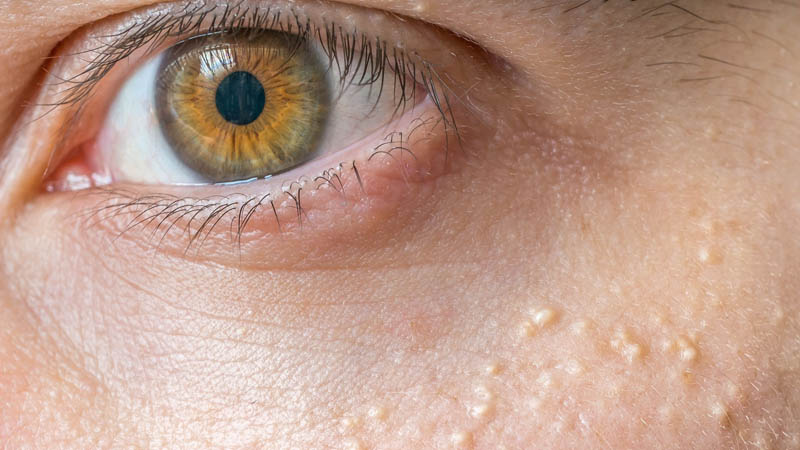If you’ve ever noticed small white bumps on your face, your first thought may have been that it was just acne. However, before reaching for your benzoyl-peroxide-filled skincare products next time you see a bump, you might want to look at them more closely. There’s a chance that they’re not whiteheads, but milia.
Now, what in the world is milia? Is there another skin concern we need to worry about? No need to panic. To break down what these tiny cysts are, how they relate to acne, and how to treat them, we asked board-certified dermatologists Rachel Maiman, M.D., and Robert Finney, M.D., for a quick rundown. See what they had to say below.
1. Milia cysts are not acne.
Milia cysts may look like whiteheads, but they are not a form of acne or related to acne at all. According to Dr. Maiman, milia cysts are tiny white bumps that contain built-up keratin just beneath the skin. They’re considered to be harmless and don’t cause any longterm complications like infection or inflammation. (“Provided that they’re not picked at,” she adds.)
They can occur anywhere on the body, but Dr. Finney says they are most commonly found on the face around the eyes, nose, or cheeks. “Our face has a higher proportion of oil glands than elsewhere on our body, and we are often applying many topical [products] and makeup as well as rubbing our face [with our hands],” he says. “These factors likely contribute to milia occurring more frequently here.”
2. There are two types of milia: primary and secondary.
Primary milia are the most common type and result from a buildup of dead skin that was unable to properly shed or wasn’t exfoliated adequately enough. Secondary milia occur when there is trauma to the skin, like sun damage or an infection. When the skin tries to heal from injury and sweat ducts become clogged, cystic lesions appear. This can also occur if you use heavy oil-based beauty products, don’t get enough sleep, or don’t take care of your skin well enough.
Anyone can get milia, and, luckily, it’s pretty easy to tell whether you have them or not. Dr. Maiman says if you find that you have “creamy white” bumps that don’t have any redness or inflammation, you have milia. Another telling sign is if the bump is firm. She explains that these cysts are difficult to extract and, if you can tell that you would cause even greater damage by manually extracting it yourself, it’s a safe bet you’re dealing with milia.
3. Milia usually go away on their own.
Good news: Milia will go away on their own in some cases. But how long they persist depends on the person. If you want to get rid of them quickly, Dr. Maiman says to go to a board-certified dermatologist who can extract the milia. Don’t try to do the extraction yourself; you’ll only irritate the area and risk further damage to the skin, she says.
4. The best treatment for milia is prevention.
Dr. Maiman advises patients with milia to look at lifestyle changes, like wearing sunscreen with an SPF 30 or higher every day and replacing skincare ingredients that might be clogging pores. “If you are experiencing milia around the eyes, try a lighter, oil-free, and noncomedogenic eye cream, and also consider avoiding oily eye makeup removers,” she says.
She also recommends incorporating exfoliation into your routine once or twice a week. “Proper exfoliation can keep keratin and dead skin cells from becoming trapped under the surface,” she says. Both Dr. Maiman and Dr. Finney recommend looking for exfoliating ingredients, like glycolic and lactic acid, or ingredients that increase cellular turnover, like retinol or retinoids.
So if you think you have milia, don’t worry. “They are annoying and pesky but not harmful,” says Dr. Finney. With the right exfoliating ingredients and slight tweaks to your skincare routine, you should be able to prevent them from appearing. And as always, if you are still concerned, head over to your dermatologist—they’ll always know what to do.



